Module 11 Body language Unit 3 Language in use课后习题课件28张
文档属性
| 名称 | Module 11 Body language Unit 3 Language in use课后习题课件28张 |
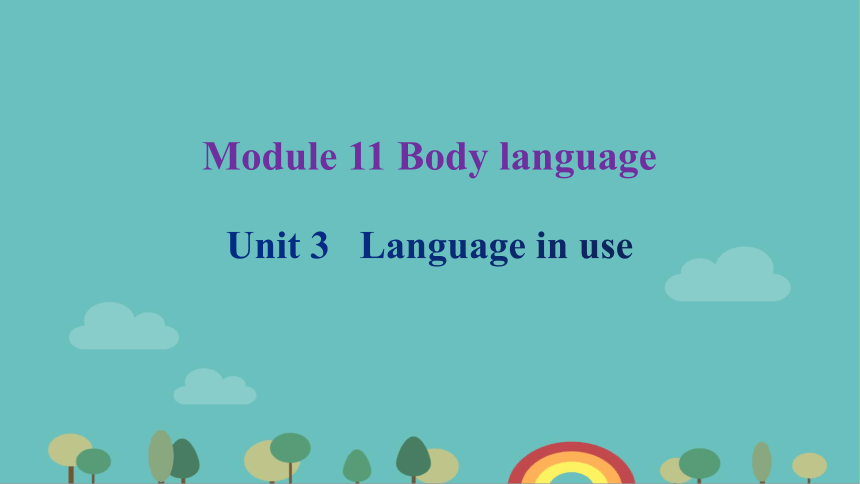
|
|
| 格式 | pptx | ||
| 文件大小 | 159.1KB | ||
| 资源类型 | 教案 | ||
| 版本资源 | 外研版 | ||
| 科目 | 英语 | ||
| 更新时间 | 2022-04-14 00:00:00 | ||
图片预览

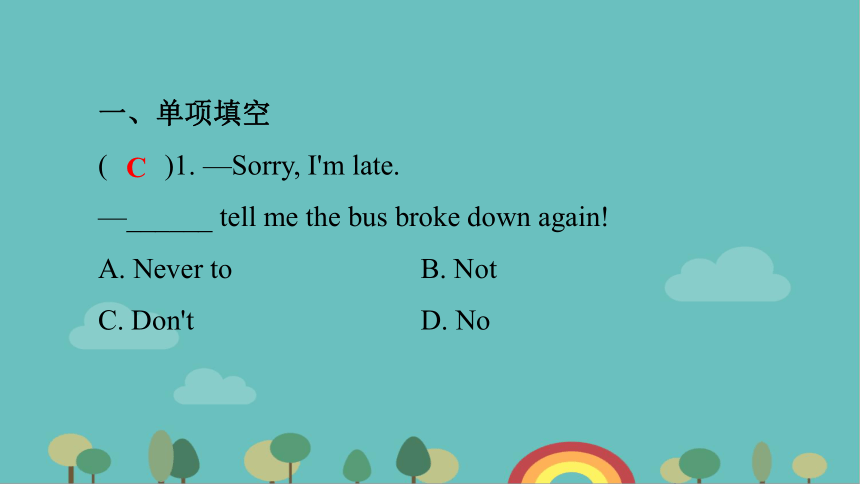
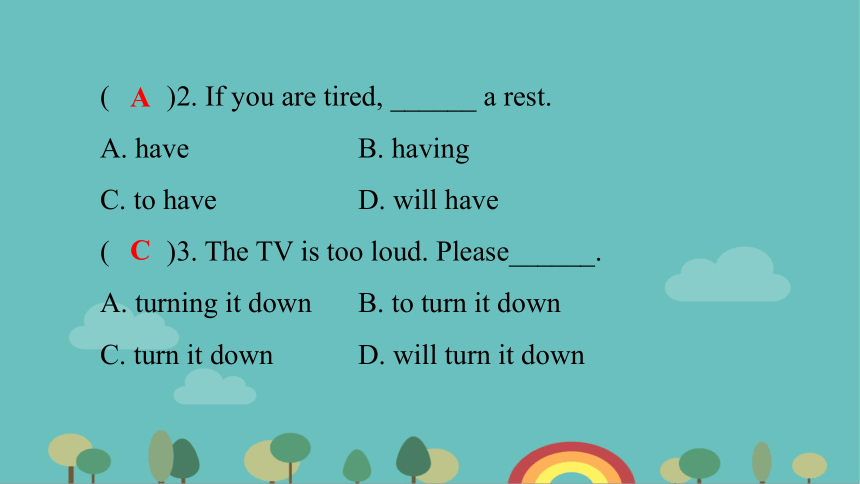
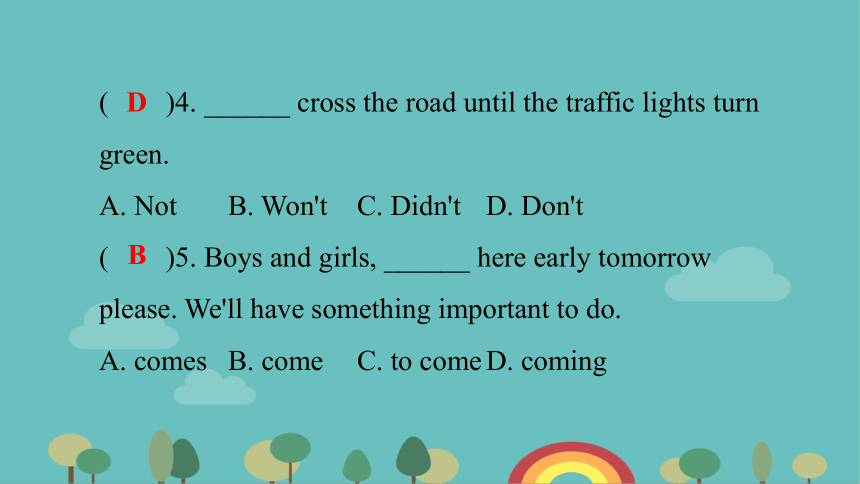
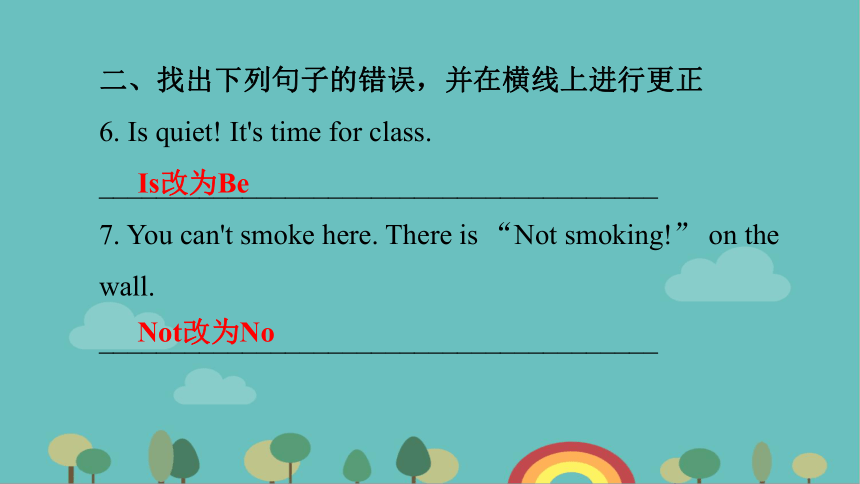

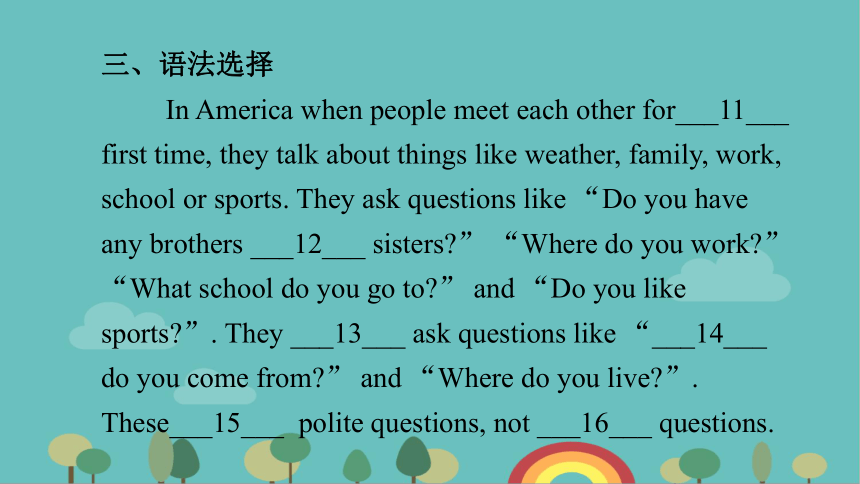
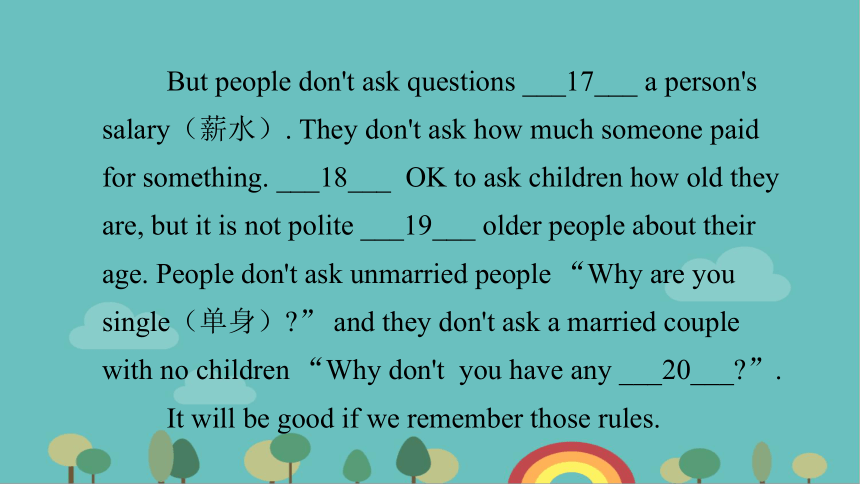
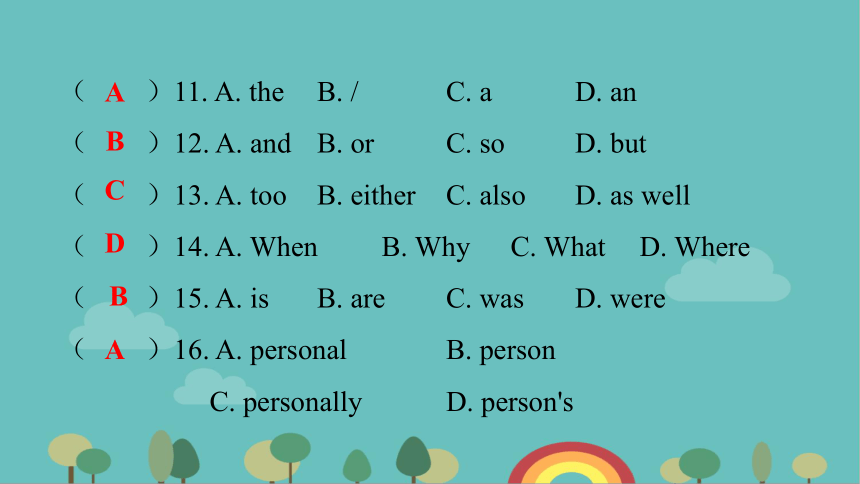
文档简介
(共28张PPT)
Module 11 Body language
Unit 3 Language in use
一、单项填空
( )1. —Sorry, I'm late.
—______ tell me the bus broke down again!
A. Never to B. Not
C. Don't D. No
C
( )2. If you are tired, ______ a rest.
A. have B. having
C. to have D. will have
( )3. The TV is too loud. Please______.
A. turning it down B. to turn it down
C. turn it down D. will turn it down
A
C
( )4. ______ cross the road until the traffic lights turn green.
A. Not B. Won't C. Didn't D. Don't
( )5. Boys and girls, ______ here early tomorrow please. We'll have something important to do.
A. comes B. come C. to come D. coming
D
B
二、找出下列句子的错误,并在横线上进行更正
6. Is quiet! It's time for class.
_______________________________________
7. You can't smoke here. There is “Not smoking!” on the wall.
_______________________________________
Is改为Be
Not改为No
8. It's a fine day today. How about have a picnic
_______________________________________
9. To be careful when you cross the road.
_______________________________________
10. Your mother is very tired. Let her has a rest.
_______________________________________
have 改为 having
To be 改为 Be
has 改为 have
三、语法选择
In America when people meet each other for___11___ first time, they talk about things like weather, family, work, school or sports. They ask questions like “Do you have any brothers ___12___ sisters ” “Where do you work ” “What school do you go to ” and “Do you like sports ”. They ___13___ ask questions like “___14___ do you come from ” and “Where do you live ”. These___15___ polite questions, not ___16___ questions.
But people don't ask questions ___17___ a person's salary(薪水). They don't ask how much someone paid for something. ___18___ OK to ask children how old they are, but it is not polite ___19___ older people about their age. People don't ask unmarried people “Why are you single(单身) ” and they don't ask a married couple with no children “Why don't you have any ___20___ ”.
It will be good if we remember those rules.
( )11. A. the B. / C. a D. an
( )12. A. and B. or C. so D. but
( )13. A. too B. either C. also D. as well
( )14. A. When B. Why C. What D. Where
( )15. A. is B. are C. was D. were
( )16. A. personal B. person
C. personally D. person's
A
B
C
D
B
A
( )17. A. of B. for C. about D. to
( )18. A. Its B. It C. It's D. Itself
( )19. A. asks B. asking C. to ask D. asked
( )20. A. child B. childs C. children D. childrens
C
C
C
C
四、完形填空
I'm a boy dragon and I live in Dragon Wood with my friends.We like football and we're going to have a football game.But nobody knows how to ___21___.I need a friend to ___22___ me.My friend's ___23___ is Benjamin.In fact,Benjamin is not a dragon—he is a boy.He knows everything about ___24___.He lives ___25___ away from us, so I need to take him to Dragon Wood first.
Today is Benjamin's birthday.And he is going to have a___26___ in the evening.I don't want Benjamin to miss his party,so we learn everything about football ___27___.We can use our feet.We can pass the ball with our tails(尾巴).But we can't ___28___ the ball with our “hands”.Benjamin tells us that it's very ___29___ to help each other during a game. ___30___,we win the game.Everybody is happy.
( )21. A. take B. make C. use D. play
( )22. A. help B. give C. push D. love
( )23. A. class B. work C. name D. job
( )24. A. violin B. guitar C. football D. piano
( )25. A. far B. near C. long D. short
D
A
C
C
A
( )26. A. dinner B. party C. sleep D. class
( )27. A. slowly B. busily C. quickly D. quietly
( )28. A. touch B. bring C. hug D. post
( )29. A. exciting B. boring
C. interesting D. important
( )30. A. Usually B. Finally
C. Carefully D. Unluckily
B
C
A
D
B
五、阅读理解(C篇)
配对阅读。左栏是五个人的情况介绍,右栏是七则信息,请为左栏的每个人选择一则合适的信息。
( )31. Dick will live in the US for a year.He wants to learn about eating there.
( )32. Emily wants to buy a birthday present for her friend.
( )33. Lisa is asked to write something about the special food in different countries.
E
G
A
( )34. Seam will travel to China this winter holiday.He wants to know how to eat at table politely.
( )35. Peter wants to learn how people greet in Northeast Asia.
B
D
A. Every country has its favourite food.For example, Italians like to eat pizza. Chinese like to eat rice and dumplings. In England,the most popular food is fish and chips.
B. In a Chinese family,when a cup of tea is put before you,you should say thank you and receive it with your two hands. While eating,you shouldn't speak with food in your mouth.
C. In the US,people shake hands when they are introduced for the first time.Friends and family members often kiss each other.Men often kiss women but not other men.
D. In Korea,men bow and shake hands when they meet each other.But women usually shake hands.And in Japan, they bow.
E. If you want to study, work or live in the United States,you will have to understand about eating in the country.Keep quiet if you don't like something or can't eat something.
F. When you go to restaurants in different parts of the world, it's important to know what to do.In China,it's OK to make some noise.However,in the West,restaurants are quiet places.
G. Welcome to Mr Smith's Store!It's a special store for birthday presents.We have birthday cakes,fresh flowers, toys,books and many other e to see for yourselves. Tel: 4556 9128.
六、回答问题
请阅读下面这篇文章,根据所提供的信息,回答5个问题。要求所写答案语法正确、语义完整,并把答案写在横线上。
There are many ways to greet (和……打招呼) someone. Different cultures have different greetings. In the US, people usually say “Hi!”or “How are you ”. In China, the old people may say “Have you eaten ”to greet others. In Bhutan(不丹), people may ask, “Is your body well ”
To greet someone, people use not only words but also actions (动作). In many countries, people often shake hands. In the US, young people, especially young men, often give a fist bump (碰拳) to greet each other. And women and men may hug a good friend. In Japan, a bow is the polite way to greet someone. In many European countries, people often greet family and friends with a kiss on the face.
When you travel, it's nice to know the polite way to greet others. But if you don't know the right greeting, a smile is always nice.
36. What may the old people say to greet others in China
________________________________________________
________________________________________________
The old people / They may say “Have you eaten ” to greet others in China. / “Have you eaten?”
37. What do young men in the US often do to greet each other
________________________________________________
________________________________________________
38. In which country do people greet each other by bowing
________________________________________________
________________________________________________
Young men in the US often give a fist bump to greet each other.
In Japan, people greet each other by bowing. / In Japan.
39. Which part of the body do European people often kiss
________________________________________________
40. What's the polite way to greet others when you don't know the right greeting
________________________________________________
________________________________________________
European people often kiss on the face. / The face.
A smile is the polite way to greet others when we don't know the right greeting. / A smile.
THANKS!
Module 11 Body language
Unit 3 Language in use
一、单项填空
( )1. —Sorry, I'm late.
—______ tell me the bus broke down again!
A. Never to B. Not
C. Don't D. No
C
( )2. If you are tired, ______ a rest.
A. have B. having
C. to have D. will have
( )3. The TV is too loud. Please______.
A. turning it down B. to turn it down
C. turn it down D. will turn it down
A
C
( )4. ______ cross the road until the traffic lights turn green.
A. Not B. Won't C. Didn't D. Don't
( )5. Boys and girls, ______ here early tomorrow please. We'll have something important to do.
A. comes B. come C. to come D. coming
D
B
二、找出下列句子的错误,并在横线上进行更正
6. Is quiet! It's time for class.
_______________________________________
7. You can't smoke here. There is “Not smoking!” on the wall.
_______________________________________
Is改为Be
Not改为No
8. It's a fine day today. How about have a picnic
_______________________________________
9. To be careful when you cross the road.
_______________________________________
10. Your mother is very tired. Let her has a rest.
_______________________________________
have 改为 having
To be 改为 Be
has 改为 have
三、语法选择
In America when people meet each other for___11___ first time, they talk about things like weather, family, work, school or sports. They ask questions like “Do you have any brothers ___12___ sisters ” “Where do you work ” “What school do you go to ” and “Do you like sports ”. They ___13___ ask questions like “___14___ do you come from ” and “Where do you live ”. These___15___ polite questions, not ___16___ questions.
But people don't ask questions ___17___ a person's salary(薪水). They don't ask how much someone paid for something. ___18___ OK to ask children how old they are, but it is not polite ___19___ older people about their age. People don't ask unmarried people “Why are you single(单身) ” and they don't ask a married couple with no children “Why don't you have any ___20___ ”.
It will be good if we remember those rules.
( )11. A. the B. / C. a D. an
( )12. A. and B. or C. so D. but
( )13. A. too B. either C. also D. as well
( )14. A. When B. Why C. What D. Where
( )15. A. is B. are C. was D. were
( )16. A. personal B. person
C. personally D. person's
A
B
C
D
B
A
( )17. A. of B. for C. about D. to
( )18. A. Its B. It C. It's D. Itself
( )19. A. asks B. asking C. to ask D. asked
( )20. A. child B. childs C. children D. childrens
C
C
C
C
四、完形填空
I'm a boy dragon and I live in Dragon Wood with my friends.We like football and we're going to have a football game.But nobody knows how to ___21___.I need a friend to ___22___ me.My friend's ___23___ is Benjamin.In fact,Benjamin is not a dragon—he is a boy.He knows everything about ___24___.He lives ___25___ away from us, so I need to take him to Dragon Wood first.
Today is Benjamin's birthday.And he is going to have a___26___ in the evening.I don't want Benjamin to miss his party,so we learn everything about football ___27___.We can use our feet.We can pass the ball with our tails(尾巴).But we can't ___28___ the ball with our “hands”.Benjamin tells us that it's very ___29___ to help each other during a game. ___30___,we win the game.Everybody is happy.
( )21. A. take B. make C. use D. play
( )22. A. help B. give C. push D. love
( )23. A. class B. work C. name D. job
( )24. A. violin B. guitar C. football D. piano
( )25. A. far B. near C. long D. short
D
A
C
C
A
( )26. A. dinner B. party C. sleep D. class
( )27. A. slowly B. busily C. quickly D. quietly
( )28. A. touch B. bring C. hug D. post
( )29. A. exciting B. boring
C. interesting D. important
( )30. A. Usually B. Finally
C. Carefully D. Unluckily
B
C
A
D
B
五、阅读理解(C篇)
配对阅读。左栏是五个人的情况介绍,右栏是七则信息,请为左栏的每个人选择一则合适的信息。
( )31. Dick will live in the US for a year.He wants to learn about eating there.
( )32. Emily wants to buy a birthday present for her friend.
( )33. Lisa is asked to write something about the special food in different countries.
E
G
A
( )34. Seam will travel to China this winter holiday.He wants to know how to eat at table politely.
( )35. Peter wants to learn how people greet in Northeast Asia.
B
D
A. Every country has its favourite food.For example, Italians like to eat pizza. Chinese like to eat rice and dumplings. In England,the most popular food is fish and chips.
B. In a Chinese family,when a cup of tea is put before you,you should say thank you and receive it with your two hands. While eating,you shouldn't speak with food in your mouth.
C. In the US,people shake hands when they are introduced for the first time.Friends and family members often kiss each other.Men often kiss women but not other men.
D. In Korea,men bow and shake hands when they meet each other.But women usually shake hands.And in Japan, they bow.
E. If you want to study, work or live in the United States,you will have to understand about eating in the country.Keep quiet if you don't like something or can't eat something.
F. When you go to restaurants in different parts of the world, it's important to know what to do.In China,it's OK to make some noise.However,in the West,restaurants are quiet places.
G. Welcome to Mr Smith's Store!It's a special store for birthday presents.We have birthday cakes,fresh flowers, toys,books and many other e to see for yourselves. Tel: 4556 9128.
六、回答问题
请阅读下面这篇文章,根据所提供的信息,回答5个问题。要求所写答案语法正确、语义完整,并把答案写在横线上。
There are many ways to greet (和……打招呼) someone. Different cultures have different greetings. In the US, people usually say “Hi!”or “How are you ”. In China, the old people may say “Have you eaten ”to greet others. In Bhutan(不丹), people may ask, “Is your body well ”
To greet someone, people use not only words but also actions (动作). In many countries, people often shake hands. In the US, young people, especially young men, often give a fist bump (碰拳) to greet each other. And women and men may hug a good friend. In Japan, a bow is the polite way to greet someone. In many European countries, people often greet family and friends with a kiss on the face.
When you travel, it's nice to know the polite way to greet others. But if you don't know the right greeting, a smile is always nice.
36. What may the old people say to greet others in China
________________________________________________
________________________________________________
The old people / They may say “Have you eaten ” to greet others in China. / “Have you eaten?”
37. What do young men in the US often do to greet each other
________________________________________________
________________________________________________
38. In which country do people greet each other by bowing
________________________________________________
________________________________________________
Young men in the US often give a fist bump to greet each other.
In Japan, people greet each other by bowing. / In Japan.
39. Which part of the body do European people often kiss
________________________________________________
40. What's the polite way to greet others when you don't know the right greeting
________________________________________________
________________________________________________
European people often kiss on the face. / The face.
A smile is the polite way to greet others when we don't know the right greeting. / A smile.
THANKS!
同课章节目录
- Module 1 Lost and found
- Unit 1 Whose bag is this?
- Unit 2 Are they yours?
- Unit 3 Language in use
- Module 2 What can you do ?
- Unit 1 I can play the piano
- Unit 2 I can run really fast
- Unit 3 Language in use
- Module 3 Making plans
- Unit 1 What are you going to do at the weekends?
- Unit 2 We're going to cheer the players.
- Unit 3 Language in use
- Module 4 Life in the future
- Unit 1 Everyone will study at home
- Unit 2 Every family will have a small plane.
- Unit 3 Language in use
- Module 5 Shopping
- Unit 1 What can I do for you?
- Unit 2 You can buy everything on the Internet
- Unit 3 Language in use
- Module 6 Around town
- Unit 1 Could you tell me how to get to the Nationa
- Unit 2 The London Eye is on your right.
- Unit 3 Language in use
- Revision module A
- Module 7 My past life
- Unit 1 I was born in a small village.
- Unit 2 I was born in Quincy.
- Unit 3 Language in use
- Module 8 Story time
- Unit 1 Once upon a time….
- Unit 2 Goldilocks hurried out of the house.
- Unit 3 Language in use
- Module 9 Life history
- Unit 1 He left school and began work at the age of
- Unit 2 He decided to be an actor.
- Unit 3 Language in use
- Module 10 A holiday journey
- Unit 1 What did you do?
- Unit 2 This morning we took a walk.
- Unit 3 Language in use
- Module 11 Body language
- Unit 1 They touch noses!
- Unit 2 Here are some ways to welcome them.
- Unit 3 Language in use
- Module 12 Western music
- Unit 1 It's so beautiful!
- Unit 2 Vienna is the centre of European classical
- Unit 3 Language in use
- Revision module B
